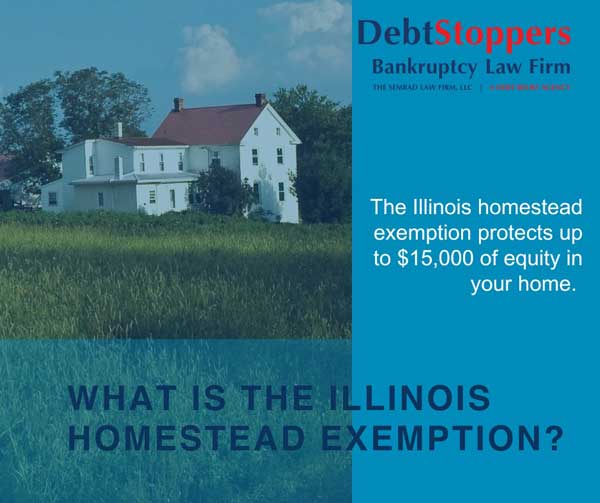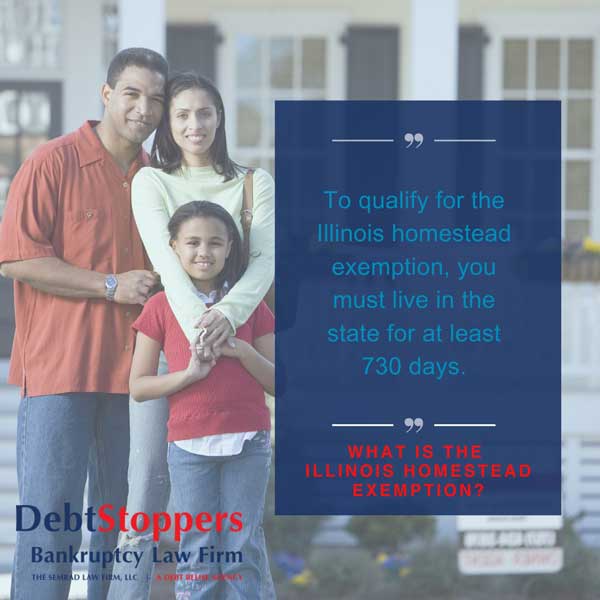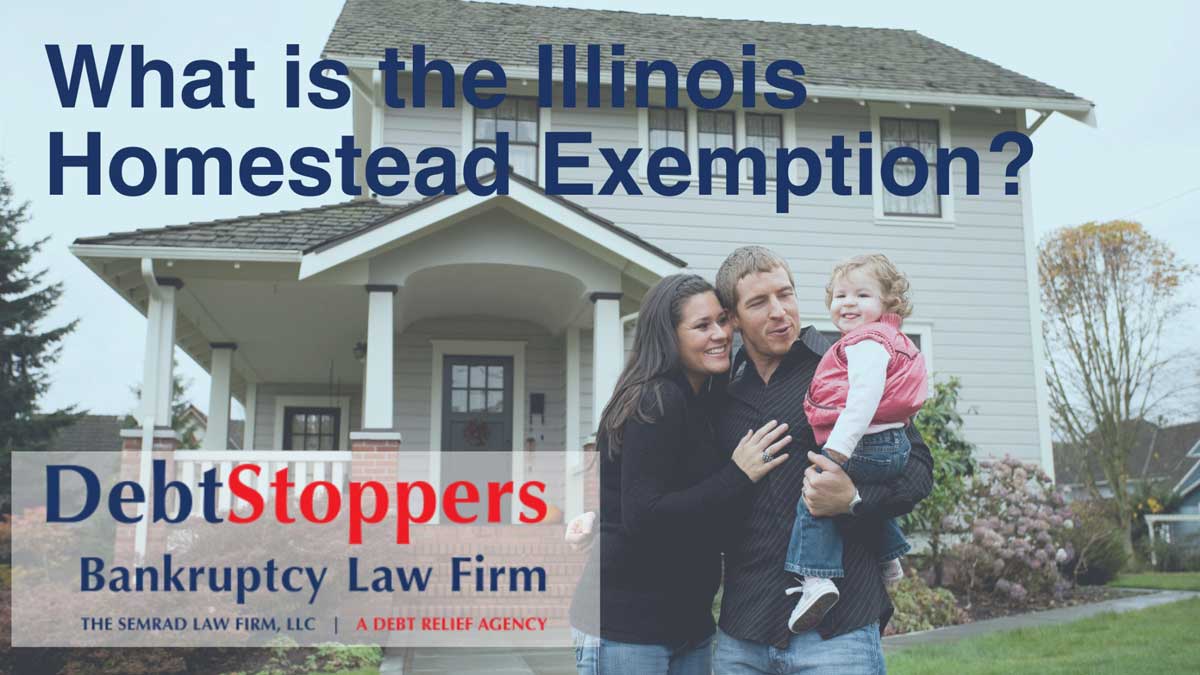Many people who consider filing for bankruptcy are concerned that they will lose their vehicle, home, or other personal items. Fortunately, the state of Illinois offers legal protection for most (if not all) of your assets. This protection is enacted through “bankruptcy exemptions,” which allow many people to keep their homes and offer protection for some of the equity in their houses.

The Illinois homestead exemption protects up to $15,000 of equity in your home. For example, if you own a home with an original mortgage of $100,000, and you now only owe $85,000, the $15,000 in equity will receive protection if you file.
You can apply this protection to a house, condo, mobile home, co-op, or any property that you utilize as your primary residence. It also applies to money you make from the sale of your primary residence.
This protection can be particularly important when a homeowner files for Chapter 7. Many people in this position are concerned about if they will be allowed to keep their house of if they will be forced to sell it to pay off creditors.
Illinois also has exemptions for property taxes, but they are entirely unrelated to bankruptcy laws.
How does a homestead exemption work in Texas?
If you are facing financial challenges or considering bankruptcy, you should know about the Texas homestead exemption and how it can benefit you. You’ll be happy to know the Texas homestead exemption is one of the most powerful tools for protecting your home. The homestead exemption protects your primary residence from creditors, meaning they generally can’t force the sale of your home to collect on unsecured debts like credit cards or medical bills.
The Texas homestead exemption is generous, meaning there is no dollar limit on the value of the property you can protect using this powerful exemption. However, there is a limit on the size of land that can be protected.
If you file for bankruptcy in Texas, the homestead exemption may allow you to keep your home, even while eliminating or restructuring other debts. The homestead exemption in Texas is one of the strongest homeowner protections in the country, which can give you peace of mind when considering your financial future.
How does a homestead exemption work in Florida?
Florida’s homestead exemption is a powerful legal protection that benefits homeowners, especially when facing debt or bankruptcy. The Florida Constitution provides generous safeguards for a person’s primary residence.
If you file for bankruptcy, the Florida homestead exemption can prevent creditors from forcing you to sell your home, regardless of its value, if you meet certain qualifications.
The Florida homestead exemption can play a critical role in Chapter bankruptcy, where assets are sometimes liquidated to pay outstanding debts. With the homestead exemption in Florida, your home is generally protected.
If you are considering Chapter 13, the homestead exemption can help you create a repayment plan without jeopardizing your house. An experienced attorney can help ensure you fully utilize this powerful exemption.
How to Apply for Homestead Exemption
Before filing for bankruptcy, consider seeking advice from a qualified bankruptcy attorney. An attorney can provide guidance on eligibility, exemptions, and the best approach based on your specific financial situation.
When filing for bankruptcy (Chapter 7 or Chapter 13), an attorney can help you complete bankruptcy forms, including Schedule C - Property Claimed as Exempt. In this form, you'll declare your intention to claim the homestead exemption to protect your home equity and specify the amount of equity you are protecting under Illinois law.
If required, attend the bankruptcy court hearings and follow all procedures outlined by the court. Be prepared to provide accurate information regarding your assets, including your home and the claimed homestead exemption. If the bankruptcy trustee has any questions or requires additional information about your claimed exemptions, be cooperative and provide the necessary documentation.
Throughout the bankruptcy process, follow the advice and instructions provided by your bankruptcy attorney. They will guide you on how to navigate the exemption process and protect your assets, including your home, to the extent allowed by law.
It's important to note that bankruptcy laws and exemptions can be complex and subject to change. Therefore, seeking guidance from a qualified bankruptcy attorney in Illinois is highly recommended to ensure accurate filing and protection of your assets, including utilizing the homestead exemption to the fullest extent permitted by law.
How Does the Homestead Exemption Work in Chapters 7 and 13?
While exemptions are relevant no matter which type of bankruptcy you file, they are especially critical in Chapter 7. Still, it’s important to understand how the chapter you choose will affect the outcome.

Homestead Exemption in Chapter 7
When you file for Chapter 7, your nonexempt property is sold by a court-appointed trustee, and the proceeds are then distributed to your creditors to pay debts. Most people who file for Chapter 7 can keep their home, as long as they’re current on mortgage payments and don’t have much equity.
Unfortunately, if you have a lot of equity in your home while filing for Chapter 7, you will likely be forced to sell the house to pay off your creditors with the proceeds. If this is the case, Chapter 13 may offer better protection.
Homestead Exemption in Chapter 13
Unlike Chapter 7, the Chapter 13 bankruptcy process allows you to keep both your nonexempt and exempt property. This means that regardless of how much equity you have in your home, you will be able to keep it.
This is particularly helpful if you have a regular income but are behind on your mortgage payments, as it will allow you to create a plan for paying off your past-due obligations.
Homestead Exemption for Persons with Disabilities
In Illinois, there is a specific homestead exemption available for individuals with disabilities who file for bankruptcy. This exemption provides additional protection for the equity in their primary residence beyond the standard homestead exemption.
Individuals with disabilities or persons aged 65 or older, who meet specific disability criteria, may qualify for an increased homestead exemption amount in Illinois. The exemption amount for individuals with disabilities or those aged 65 and older is $15,000, regardless of family status.
The disability criteria typically include being unable to engage in substantial gainful employment due to a physical or mental impairment expected to last for a continuous period of at least 12 months.
When filing for bankruptcy (Chapter 7 or Chapter 13), individuals with disabilities can claim this specific homestead exemption to protect their home equity beyond the standard exemption amount.
It is highly advisable for individuals with disabilities considering bankruptcy to consult a qualified bankruptcy attorney to help navigate the exemption process and ensure that the available exemptions, including the disability homestead exemption, are properly applied.
How Do You Qualify For a Homestead Exemption in Illinois?
You must meet certain requirements to receive bankruptcy exemptions. First, you must live in Illinois for more than 180 days before you can file for bankruptcy there.
To qualify for the Illinois homestead exemption, you must live in the state for at least 730 days. If you have not lived in the state for at least this long, you will be required to use the exemptions from the state where you previously lived.
Married Couples and the Homestead Exemption
If you are married and filing jointly, $30,000 of equity in your primary residence will be covered, doubling the standard protection. This only applies if both spouses have an ownership interest in the property.
Final Thoughts
Filing for bankruptcy is never an easy decision, especially if you are worried about losing your home. Fortunately, the laws offer several options that you can use to stay in your house.
Financial freedom doesn’t mean you have to give up the roof over your head. Schedule a free case evaluation with one of the skilled Illinois bankruptcy lawyers at DebtStoppers and get the help you deserve.





